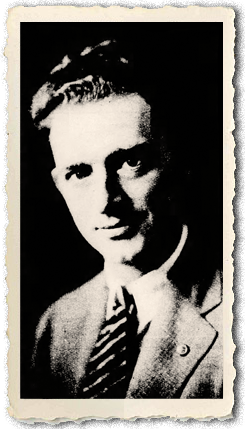Painton’s Letters Home from WWI | 24 December 1918
THIS month we’re featuring  Frederick C. Painton’s letters he wrote home while serving with the American Expeditionary Forces in WWI. Portions of these letters were published in his hometown paper, The Elmira Star-Gazette of Elmira, New York. Before the war young Fred Painton had been doing various jobs at the Elmira Advertiser as well as being a part-time chauffeur. He was eager to get into the scrap, but was continually turned down because of a slight heart affliction and was not accepted in the draft without an argument. He was so eager to go that he prevailed upon the draft board to permit him to report ahead of his time. Painton left Elmira in December 1917 with the third contingent of the county draft for Camp Dix but was again rejected. He was eventually transferred to the aviation camp at Kelly Field as a chauffeur, and in a few weeks’ time was on his way to England in the transport service with an aviation section, where he landed at the end of January 1918 as part of the 229th Aero Supply Squadron. He was transferred to the 655 Aero Squadron in France shortly thereafter and then to the 496th and eventually attached to the staff of The Stars and Stripes just before the end of the war and stayed on with the occupying forces.
Frederick C. Painton’s letters he wrote home while serving with the American Expeditionary Forces in WWI. Portions of these letters were published in his hometown paper, The Elmira Star-Gazette of Elmira, New York. Before the war young Fred Painton had been doing various jobs at the Elmira Advertiser as well as being a part-time chauffeur. He was eager to get into the scrap, but was continually turned down because of a slight heart affliction and was not accepted in the draft without an argument. He was so eager to go that he prevailed upon the draft board to permit him to report ahead of his time. Painton left Elmira in December 1917 with the third contingent of the county draft for Camp Dix but was again rejected. He was eventually transferred to the aviation camp at Kelly Field as a chauffeur, and in a few weeks’ time was on his way to England in the transport service with an aviation section, where he landed at the end of January 1918 as part of the 229th Aero Supply Squadron. He was transferred to the 655 Aero Squadron in France shortly thereafter and then to the 496th and eventually attached to the staff of The Stars and Stripes just before the end of the war and stayed on with the occupying forces.
SERGEANT FRED PAINTON LEARNS IT COSTS TO EAT IN LUXEMBURG
Elmira Star-Gazette, Elmira, New York • 24 December 1918
Writes That One Day’s Meals Cost $12, but the People of the Duchy Appear to Eat Well Just the Same—Is Attached to Third Army.
Sergeant Frederick C. Painton, former Elmira newspaperman, now a member of the staff of The Stars and stripes, the official paper of the American Expeditionary Forces, was in Luxemburg November 26, the date of his last letter. According to the Elmira soldier, Luxemburg is no place to sojourn on a private soldier’s salary, unless the latter carries his own canteen along with him. One day’s meals cost about twelve dollars.
Sergeant Painton writes:
November 26, 1918.
“Dear Friend:
“I think that my presence in Luxemburg will take you by surprise, but, anyway, here I am enroute for Paris. This is sure some beautiful city, but talk about the high cost of living, this takes the brown derby. The Alaskan gold rush couldn’t even touch it. Here are some of the prices in American money that I had to pay today: Two dollars for breakfast, four-dollars for lunch, and five-fifty for dinner. Remember, this is for one only. There is a candy shop near here where a bar of chocolate of ordinary size costs $16 each. Beer is fifty cents a small glass, and four sticks of licorice costs two dollars. Ice cream is fifty cents a glass and ordinary wine like we buy in Paris for three franc a bottle costs twenty here. These were the prevailing prices before we came and in some cases they were even higher.
“All the citizens have a sleek, well-fed appearance, and, as I found no signs of paper clothes or wooden shoes here, I think I will have to go further into Germany to find them I shall go further as I shall be attached to the Third Army. There is a great deal to tell you, so I shall put most of !t off until I get back to Paris. That trip following the German retreat was the greatest thing in my young life.
“I saw Jack Wilkinson in Paris and have a date with him for Wednesday night if all goes well. If you would like a Boche helmet for a souvenir I can send you one. We came upon hundreds of boxes of new helmets that were ready to be Issued. We all had Mauser rifles for souvenirs and plenty of “ammo.” so shot holes through some of them for practice.
“Well, it is time to hit the hay, so will close. This is the first time I have slept in a bed in two weeks, so I will make it a good one. I was stationed in Verdun for three or four days and had to sleep in an old shack on the floor.
“Every sign in this town is painted in both French and German, although the latter language is in more use.”
- Download clipping (24 December 1918, Elmira Star-Gazette)
- Download full page (24 December 1918, Elmira Star-Gazette)




